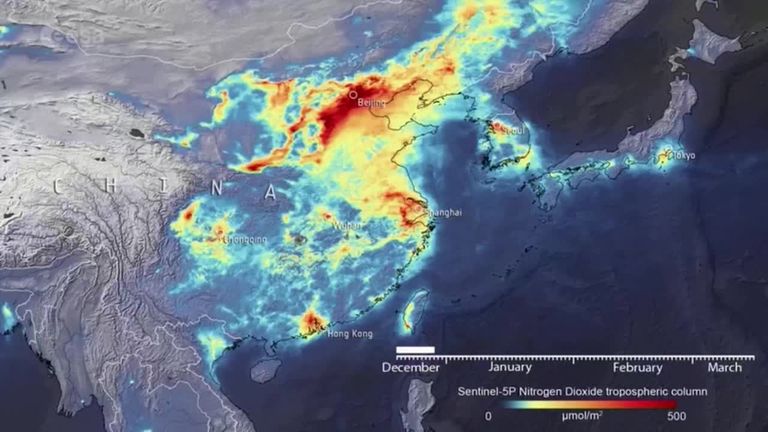Coronavirus: Enviromental destuction 'paused' by lockdown measures
Jonathan Bartley says the response to the COVID-19 pandemic has shown we can create a safer world, if governments take action now.
Thursday 7 May 2020 09:45, UK
Lockdowns around the world have had unexpected environmental benefits, causing carbon emissions to fall and air quality to rise.
Co-leader of the Green Party Jonathan Bartley says we can learn how to create a safer world from the lockdown.
The coronavirus crisis and our response to it have posed huge questions about the way that we live, work and run our economy - and how that impacts our environment.
Scientists have warned of increased risk of more pandemics from the destruction of nature, rampant deforestation, intensive farming, mining, global air travel as well as exploitation of wild animals.
Together they have created a 'perfect storm' for the spillover of diseases from wildlife to people.
But lockdowns around the world have pressed pause on much environmental destruction.
The International Energy Agency has that the fall in energy demand as a result of the corona shock could see an 8% decline in carbon emissions.
Meanwhile, the Centre for Research on Energy and Clean Air has also suggested that the improvement in air quality over the last month has led to from pollution in the UK and Europe.
:: Listen to the Backstage podcast on , , ,
It would be wrong to celebrate these things that have come as tens of thousands have died from the pandemic and millions face huge hardship.
But right now decisions are being made that will determine whether we use what we have learnt to create a safer world in which we can live better lives.
The response to the pandemic has given us a glimpse that another world is possible.
For many businesses, charities and other organisations the penny has dropped that jobs we thought couldn't be done from home actually can be.
It won't be possible for everyone.
But now is the time for Government to provide greater incentives and support for home and flexible working for those who want it.
The head of the AA recently said he thought people would never fully return to their previous travel habits.
So it also makes sense to scrap the road expansion programme and invest the money in the country's low carbon infrastructure, whether that be better broadband to enable more effective homeworking or cheaper and better public transport.
Fossil fuels were already on the way out before this crisis hit. And as the fossil fuel industry has struggled in the current crisis, renewables have withstood the economic shock.
We need to see a stronger and bigger renewable industry, lower fuel bills and the creation of hundreds of thousands of new green jobs at the heart of our recovery from this crisis.
There should be no bailouts for the big polluters that we have all subsidised for too long from our taxes.
But in order to safeguard jobs, polluting companies that are struggling should be taken over by Government.
We have seen in this crisis the ability of industry and business to adapt to new circumstances.
So, Government should change and adapt these companies and industries safely so they can play a part in the new kind of economy we need to create to provide secure work for everyone.
That same focus and urgency that has been evident in the immediate response to coronavirus needs to ensure we do not fall back on the same old ways of doing things as before this terrible virus emerged.
What we need to see is a new normal, with investment to build back better to a safer world in which we can live better lives.








